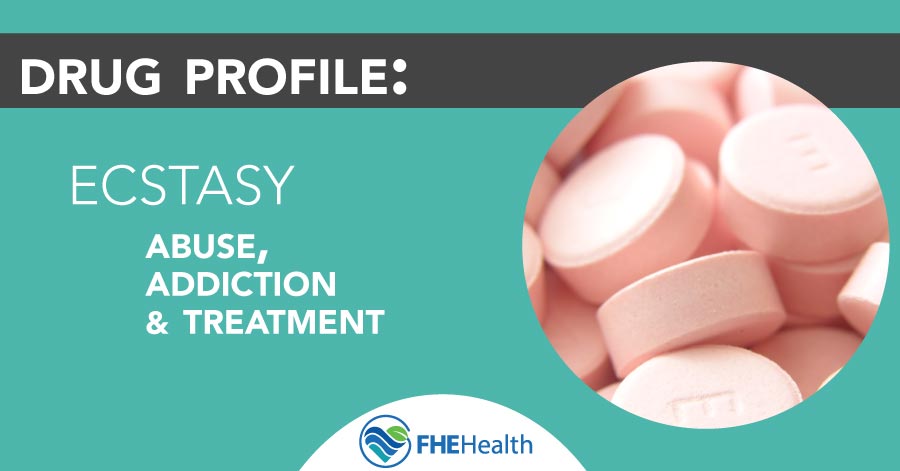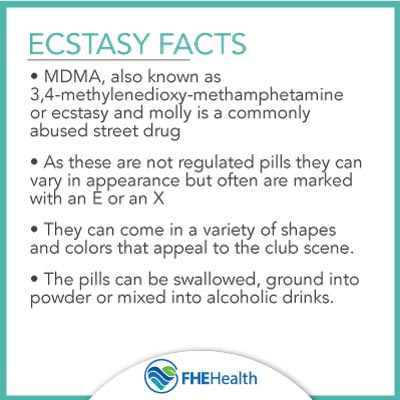
MDMA, also known as 3,4-methylenedioxy-methamphetamine, ecstasy and molly, is a commonly abused street drug, similar to stimulants and hallucinogens, that produces feelings of high energy, emotional connectedness and pleasure. The drug commonly distorts time and sensory perception, making it popular among young adults in the club scene, where it flourished in the ’90s. The history of ecstasy began in 1912, when American pharmaceutical company Merck patented the compound as a precursor to other drugs used to stop bleeding.
In the 1950s, the U.S. Department of Defense performed classified experiments with the substance, but little came of it. MDMA unexpectedly emerged as a recreational drug in Chicago around 1968. By 1970, the DEA had assigned it a Schedule I rating, meaning it has no therapeutic uses and a high risk of addiction. Today, around 2.6 million Americans report using ecstasy at least once in the previous 12 months.
How to Identify Ecstasy
Ecstasy goes by many names and turns up in multiple forms among recreational users. The most common form of MDMA is a small rhomboid white pill with a large “X” on one side. This gives the drug one of its common street names, “X.” Other names for MDMA include:
- E
- Molly or Molly drug
- Adam
- Beans
- XTC
- Clarity
- Disco Biscuit
- Eve
- Go
- Hug Drug
- Lover’s Speed
- Peace
- STP
Users can swallow the pill to get the full effect for about an hour or grind it into powder for a quicker hit. One common practice among habitual users is to swallow one pill for a long-term effect that comes on slowly, then snort a ground-up pill for a fast hit that wears off quickly. MDMA can also be dissolved in liquid, usually alcohol, and discreetly drunk in a club setting. Liquid ecstasy is less common but can be used to spike drinks, with or without the user’s knowledge or consent.
What Does Ecstasy Do?
Ecstasy elevates the concentration of three brain chemicals: dopamine, norepinephrine and serotonin. Together, these neurotransmitters increase energy, elevate heart rate and blood pressure and affect mood, appetite and the ability to sleep. The dopamine hit also affects the brain’s reward centers and triggers the desire to take more of the drug.
Physically, ecstasy causes various side effects, which may include:
- Nausea
- Muscle cramping
- Involuntary teeth clenching
- Blurred vision
- Chills
- Sweating
The effects of ecstasy may last anywhere from 3 to 6 hours, depending on the dose taken, whether it was taken on an empty stomach and the user’s tolerance level. It’s common for heavy users to “boost” or take a second dose when they perceive the first dose is wearing off. This can be dangerous, especially when the user has combined ecstasy with other drugs such as marijuana, cocaine and alcohol.
Ecstasy side effects that unfold over a longer timeframe can be more subtle. In the week following a dose, it’s common for users to experience:
- Irritability and anxiety
- Impulsiveness and aggression
- Depression
- Sleep problems
- Memory and attention problems
- Decreased appetite
- Diminished interest in and pleasure from sex
Addiction to Ecstasy
 Ecstasy is an addictive drug that induces both physical and psychological dependence. Users frequently escalate their drug consumption over time, needing more to get the same high that a lower dose used to provide. Over the long term, ecstasy causes irreversible brain damage, as it reduces the brain’s sensitivity to serotonin, causing clinical depression that may never entirely go away.
Ecstasy is an addictive drug that induces both physical and psychological dependence. Users frequently escalate their drug consumption over time, needing more to get the same high that a lower dose used to provide. Over the long term, ecstasy causes irreversible brain damage, as it reduces the brain’s sensitivity to serotonin, causing clinical depression that may never entirely go away.
Identifying a person who abuses ecstasy can be challenging, since it’s commonly used with other substances and may be masked by the apparent use of those drugs. A person who’s recently taken ecstasy is likely to appear flushed and sweaty, unless they’ve become dehydrated to the point that they can no longer sweat. At this point, their skin will be flushed and dry, with their temperature continuing to rise dangerously. Overheating and dehydration are among the most common symptoms of an ecstasy overdose, as well as leading causes of hospital admission after use.
People under the influence of ecstasy often exhibit pressured speech, in which they speak rapidly and forcefully, beyond what’s usually appropriate. They commonly grind their teeth and may have a pacifier, sucker or another object in their mouths to control this tendency. Because the drug induces strong feelings of empathy and affection, people using it may appear loving or inappropriately familiar with strangers, often touching or caressing others or encouraging them to touch and caress them.
Over the long term, ecstasy users often develop depression and insomnia. People who use ecstasy over extended periods frequently lose weight, reduce or stop having sex and develop difficulty remembering recent events. They may become lethargic and unmotivated, increase their alcohol intake or alienate old friends and family members in favor of new “club” friends who share their lifestyle.
Treatment for Ecstasy Addiction
Treatment for ecstasy addiction starts like any other addiction recovery approach, with the user admitting to the problem and resolving to seek help. It’s strongly recommended that people addicted to ecstasy find professional care in a dedicated inpatient setting, at least for the initial detox and care plan. Detoxification from heavy ecstasy abuse may require medical intervention from a physician specializing in addiction medicine and a skilled nursing care team.
After the initial detox, a person’s care needs are assessed. Some patients need to stay in an inpatient setting for several days or weeks before transitioning to outpatient care. Others may do best with direct outpatient services. In many cases, recovery from ecstasy addiction requires an SSRI or other depression medication to address the altered brain chemistry caused by the drug. Over the long term, users with a history of ecstasy addiction can maintain sobriety by continuing a 12-step program and sponsorship, which helps people return to a normal life free from their former drug scene.
Help for People With a History of Ecstasy Abuse
If you or someone you care for is using ecstasy, it’s time to get the help you need. Call today and speak with one of our compassionate counselors. We’re here to help you 24/7 to get a start on a lifetime of recovery.






